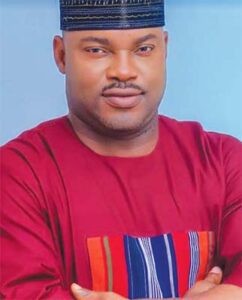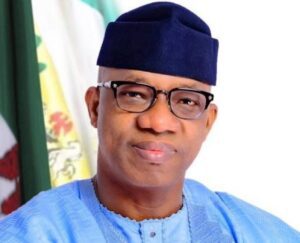
With blockchain, it is possible to automate trust, reduce cost —Co-Founder, Appzone
In this interview, the Co-founder, Appzone, Wale Onawunmi discusses with Mathew Ibiyemi the role of technology in improving reliability, building trust, and reducing cost in the corporate world, most especially through the use of blockchain. Excerpts:
What inspired you to choose a career in technology especially during a period when banking was probably the most preferred career path of many young persons?
I remember an incident that inspired my choice of career as far back as when I was in primary school. I’ve always been fascinated by technology and enjoyed repairing electronics that were damaged in the house. Luckily one day, when I was nine years old, my dad had a visitor delivering something like a box with a screen to our study room. I wondered what this thing with a nice flashing display called a computer was. Out of curiosity, I tapped a key on the keyboard which made the screen go blank displaying a message saying “device could not be recognized, try again”. I was so worried I had damaged this computer thing, so I asked my brother for help, and we fiddled around with it to no success until my dad came back. He assured me it was something simple and proceeded to turn the knob of the floppy disk drive and wow, it started working again. From that day on, I decided that I needed to know more about computers and technology in general.
I’ve had a long history with computers from that singular event till now. I was fortunate to have worked with different families of computers from Intel 8086, 286 and the Pentiums. My father noticed my interest in computers and recommended that I increase my interest in it. He foresaw a future dominated by computers and encouraged me to consider it as a field of study in the university which then culminated in my studying Computer Science with Economics at Obafemi Awolowo University, Ile-Ife.
I had to choose a focus area between hardware and software. I believed hardware was limiting because it required physical components to work on. So, I aimed for software and I have not looked back since. In school, I had my internship at a software company which broadened my horizons to the fact that I can build software that will change the world. I have been working with computers for about 30 years now and my motivation hasn’t changed.
30 years is a long time of various evolutions and disruptions in the technological space.
As one of the very first few “tech gurus” in the early years of Nigeria’s tech ecosystem, how proud are you to see the growth of the industry today?
The technological space has evolved rapidly, not just in the world but also in Nigeria over the years. First of all, the computing hardware has matured significantly. All electronic devices are now computers in different forms and sizes. We have witnessed a significant adoption of mobile devices by Nigerians, which implies that almost everyone has a computer at all times. Also, we have seen vast improvements in internet connectivity from the days of VSAT satellites to broadband and now 5G which boasts incredible speeds.
Also, when you look at the impact it has had on sectors like banking and payments, you will realize how technology has evolved. We have witnessed a transition of banking from being somewhere you go, to something you do with the introduction of internet and mobile banking apps. There are hardly any reasons for one to visit bank branches anymore. There have also been innovations around ATM card issuance. I remember having to wait weeks to get an ATM card but those are things of the past. Now, you can walk into a branch and collect a new card from a card vending machine in 2 minutes. And of course, instant interbank transfer has become the norm. It is difficult to remember a time when interbank transfers were received the next working day. These are just a few of the transformations I have witnessed and I am quite proud of, and I know there is still so much more to come.
What role have you been playing since you stepped into the role as Appzone’s CTO in 2008?
In 2008, we founded Appzone and I assumed the role of CTO. Being CTO is about building and delivering high quality technology. As a tech company, one of the things you must deliver on, even if you sell a good range of products, is the technology working perfectly.
However, technology evolves so rapidly that there is the need to keep up with the trends and figure out how to use those new developments to make an impact and make changes as the company grows.
The other thing was to gather the right team to deliver on the promise of these innovative technologies and build out high quality products given limited resources.
In summary, my role was, and still is, building out the right team, empowering them with the right tech and applying these new technologies to add significant advantage to our internal systems and products.
With limited resources as at the time you started, how was Appzone able to build globally relevant products from scratch?
There are two main things that I would say that allowed us to achieve this. The first thing was that we realized we needed to have the right kind of people. Our need to grow talent made it such that we invested a lot in training, and we encouraged the trainees to be a part of the system. So, we sought out very sharp minds by going to schools to recruit them. We went to the technology departments, talked to them and engaged them with tests because we realized building a world class solution is not easy, it requires not just processes but talent, especially when working with new and complex technologies.
The second thing that helped is that we also paid attention to global standards and practices, from software development life cycles to operational processes others similar companies had figured out already. We were open to learn and research into how these things were done and how to incorporate those standards effectively.
Were you paying the trainees?
Yes, of course. We gave stipends, something to keep them able to transport themselves and take part. It was more like running a school and we looked forward to people graduating, it was really the effort. This helped us run in an environment that had the resources not readily available. When you go out there, the people you find don’t have the required skill-set and standards they’re expected to, while those that have the required skill-set are few and too costly to recruit. At that stage as a startup, you can’t compete with bigger companies to hire the kind of employees with the skill-set you are looking out for because of limited funding.
How did Appzone envision the opportunities that would come with cloud technology which then informed the build of its BankOne product?
Interestingly, we started building BankOne in 2009 and the cloud was unknown then. It was very new but we were very adventurous as a Tech company and decided to bet on the cloud.
Back then, our focus was building custom software for banks to solve problems in which the “off-the-shelf solutions they got didn’t fully address. We realized the other financial institutions that weren’t as big as banks didn’t even have that off-the-shelf and core infrastructure, so we decided to create this infrastructure for the smaller players. This is what birthed our BankOne product. Afterwards, we realized that there were a lot more of those institutions than commercial banks and as a start-up we were worried about how we would serve all of them in a cost-effective and scalable way. This is where the cloud technology came in. It allowed us to use infrastructure that belonged to big tech and scale accordingly in a cost-effective way and so it was a perfect fit. Now, BankOne is a world-class cloud-native digital core-banking platform serving over 500 financial institutions as their core infrastructure, fully integrated to the payment ecosystem, to enable them deliver innovative and high quality services to their customers.
Appzone has evolved to become a blockchain payment infrastructure company. Why now?
At Appzone, we have always been early adopters of innovative technology that we believe can transform industries. The cloud was one of them and we took the bold step then to adopt and promote it, despite the challenges. Now, most companies, local and international, deliver their services from the cloud. We also believe blockchain is a transformative technology. The technology can enable new ways for businesses to work together, not just in relation to payments but in every type of transaction. Historically, businesses have not been able to authenticate or validate digital records or copies in a trustworthy way without the need of an intermediary acting as a trusted independent party. So, even though a lot of digital transformation has occurred, and business data and processes are digital now, businesses cannot rely solely on digital copies of data as a source of truth in interparty-related transactions. This is because digital data can be fabricated or altered. However, with a blockchain network, businesses can rely solely on digital records they have created and treat as original true copies, as they would with paper records, when transacting with each other in a transparent way.
So, you can’t have a copy of or replicate blockchain technology, is that what you mean?
No, that’s not it. Blockchain technology relies on data being replicated across the network. However, it is the digital records captured on the blockchain network itself that are secured in an immutable way. If you put something on blockchain, the data remains intact and the same for the entire existence of the blockchain network. Businesses can rely on the fact that any data captured on the blockchain network is not just immutable but also available for all relevant parties to see. With blockchain, it is possible to automate trust by providing a secure and transparent way of dealing with interparty transactions without the introduction of intermediaries to broker such transactions. Some examples of the application of blockchain technology include issuance of digital identity, implementation of digital contracts, digital rights management, digital voting and also digital banking and payments. We’ve seen how we can leverage blockchain to significantly improve and innovate on payment infrastructure, just as we did with cloud for core banking infrastructure on our BankOne product. Appzone is evolving to play a pioneer role in the inevitable evolution of payment infrastructure, which is been brought about by the incorporation of blockchain technology.
What are the benefits that blockchain technology is bringing on board?
Although digital payments have been on the rise, the primary areas of challenges to full adoption have been quality of service and customer experience. Blockchain technology helps to improve these two areas significantly.
Firstly, blockchain networks leverage a peer-to-peer architecture that allows the different parties connect directly to one another with no reliance on an intermediary or a central entity. These central entities introduce an additional failure point to the payment network which in turn is a risk that can affect reliability. By removing this requirement, blockchain significantly improves reliability of the payment network.
Secondly, when there are customer complaints about transaction status or success, the financial institutions must rely solely on the central entity or intermediary to provide this information authoritatively. However, with blockchain, which acts at the source of truth for transactions and is available to all relevant parties, these institutions can now treat customer requests in near-realtime as the information is readily available to them. This will significantly improve customer experience by reducing the turn-around time in handling customer disputes. It also enables complete automation of the entire dispute process, like proactively resolving reversal issues without complaints being logged.
As the adoption of CBDCs and potentially, regulated digital currencies grow, we would witness the automation and decentralization of financial services. With decentralized financial services or DeFi, the operation of financial services is managed entirely by computer programs on the blockchain network. This automation will significantly reduce the cost of delivering financial services.
So, what should we expect from Appzone in the coming years as it evolves continually?
Our vision as a payment infrastructure company, is to provide a global API to pay anyone, anywhere with any instrument, be it ATM cards, mobile phones or other means of biometric authorization. We are arduously working towards this vision by connecting financial institutions to our layer-1 blockchain network. We have currently integrated most of the commercial banks to our blockchain network and are at various stages of implementation for some FinTechs and other financial institutions. The network will eventually connect all regulated financial institutions, not just in Nigeria but across the continent, as we seek to expand the network globally.
Also, we are looking to ensure that the financial institutions can leverage the full benefits of this infrastructure by turning on the various use-cases for interbank transactions such as in-store merchant payments, web payments and agent banking.
We are strong advocates of regulating digital currencies as we believe this is the only way to really achieve mainstream adoption and we look to work alongside with the regulators and other relevant stakeholders in the industry to chart a course to put the necessary controls in place to safeguard the industry without sacrificing the core benefits of blockchain.



